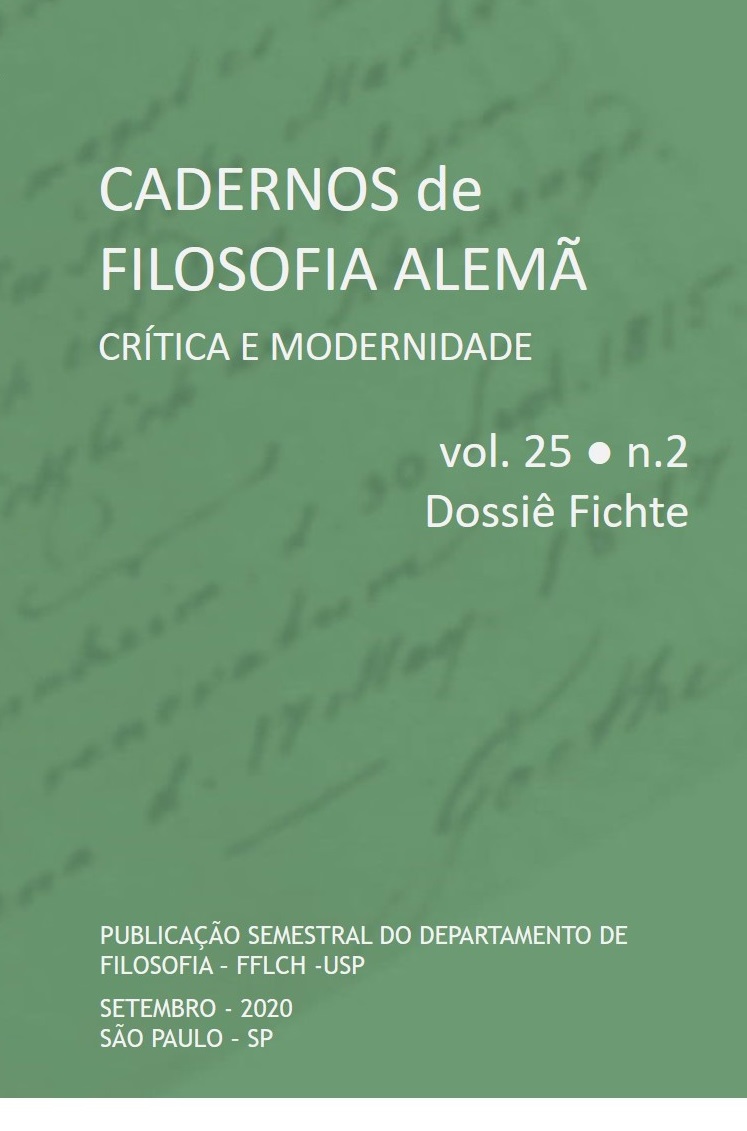Christianity as an education of humanity in Fichte
DOI:
https://doi.org/10.11606/issn.2318-9800.v25i2p173-191Keywords:
Fichte, Lessing, Philosophy of Religion, Philosophy of History, ChristianityAbstract
Starting from Lessing’s precedent, the understanding of Christianity in Fichte as an educational process of humanity is analysed, underlining the proximity and differences between the two authors. Ancient world religion, message of Christ and rational Christianity are the phases of such development. Finally, the Christian heritage is highlighted in the understanding of the genetic method of the Doctrine of Science, as well as the hermeneutical horizon that also characterizes Fichte's position.
Downloads
References
Andreu, A. (1982). “Notas al pie de página”. En Lessing, G.E. Escritos filosóficos y teológicos. Traducción de A. Andreu. Madrid: Editora Nacional.
Asmuth, Ch. (1999). Das Begreifen des Unbegreiflichen. Philosophie und Religion bei J.G. Fichte 1800-1806. Stuttgart: Frommann Verlag.
Barr, H. (2013). “Gotthold Ephraim Lessing”. En: Hofmann, M. (ed.). Aufklärung. Epoche, Autoren, Werke. Darmstadt: Wissenschaftliche Buschgesellschaft.
Brito, E. (2004). J.G. Fichte et la transformation du christianisme. Lovaina: University Press & Peeters.
Bultmann, R. (1958). Theologie des Neuen Testaments. Tubinga: J. Mohr.
Cassirer, E. (1943). Filosofía de la Ilustración. Traducción de E. Ímaz. México: FCE.
Fichte, J.G. (1964ss). Gesamtausgabe. Stuttgart/Bad Constatt: Bayerische Akademie der Wissenschaften.
Fuchs, E. (1978). Fichte im Gespräch. Berichte der Zeitgenossen (vol. I). Stuttgart: Frommann Verlag.
Gili, F. (2007). Die Präsenz der ‘Populärphilosophie’ im Spätwerk Fichtes. Fichte-Studien, 31, 195-204.
Janke, W. (1999). J.G. Fichtes Wissenschaftslehre 1805. Darmstadt: Wissenschaftliche Buchgesellschaft.
Jeremias, J. (1971). Neutestamentliche Theologie. Gütersloh: G. Mohn.
Kant, I. (1968). Kritik der Urteilskraft. Akademie-Textausgabe, vol. V. Berlín: Walter de Gruyter.
Lauth, R. (1963). Die Bedeutung der Fichteschen Philosophie für die Gegenwart. Philosophisches Jahrbuch, 70, 252-270.
Léon, X. (1922). Fichte et son Temps (3 vols.). París: Arman Colin.
Lessing, G.E. (1965). Die Erziehung des Menschengeslechts. Stuttgart: Reclam.
Marszalek, R. (2006). Fichtes Religionstheorie im Licht der Schellingschen Gedanken zur Mythologie. Fichte-Studien, 26, 121-129.
Rametta, G. (2003). “Doctrine de la science et Doctrine de l’État. La dissolution de la théologie politique chez le dernier Fichte”. En : Goddard, J.Ch. y Maesschalck, M. (eds.). Fichte. La philosophie de la maturité. París: J. Vrin.
Tilliete X. (2003). Fichte. La science de la liberté. París: J. Vrin.
Turró, S. (2013). La idea de Europa en Fichte. Anales del Seminario de Historia de la Filosofía de la Universidad Complutense, 30, 107-135.
Turró, S. (2017). “Estudio preliminar”. En Fichte, J.G. Lecciones sobre filosofía aplicada. Doctrina del Estado. Traducción de S. Turró. Salamanca: Sígueme.
Turró, S. (2019a). El establecimiento del reino de la razón. Argumenta Philosophica, 1, 53-69.
Turró, S. (2019b). “Estado, cristianismo e historia en Fichte”. En Ferrer, D. (ed.). A Filosofia da História e da Cultura em Fichte. Coimbra: Imprensa da Universidade de Coimbra.
Widmann, J. (1977). Die Grundstruktur des transcendentales Wissens nach J.G. Fchtes Wissenschaftslehre 1804 . Hamburg: Meiner.
Villacañas, J.L. (1993). Fichte und die charismatische Verklärung der Vernunft. Fichte-Studien, 5, 117-148.
Vollhardt, F. (2018). Gotthold Ephraim Lessing. Epoche und Werk. Gotinga: Wallstein Verlag.
Downloads
Published
Issue
Section
License
Copyright (c) 2020 Salvi Turró

This work is licensed under a Creative Commons Attribution-NoDerivatives 4.0 International License.
Information and conceptions on the texts are complete responsibility of the authors.
All the articles submitted before July 5th 2018 and those published after July 2021 are licensed under a CC BY-NC-ND license – except those published between the aforementioned dates, which are under the CC BY-NC-SA license. The permission for the translation of the material published under the license CC BY-NC-ND by third parts can be obtained with the consent of the author.
Open access policies - Diadorim
Rules applied before July 5th 2018:
Presenting a submission to our Editorial Board implies granting priority of publication for “Cadernos de filosofia alemã”, as well as transferring the copyright of texts (once published), which will be reproduced only with the manifest authorization of the editors. Authors keep the right to reuse the texts published in future editions of their work, without paying any fees to "Cadernos”. We will not grant the permission to re-edit or translate the texts for third parts without agreement of the author.


